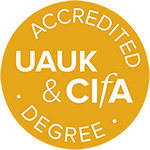Current filters applied:
- (-) Remove Palaeolithic/Mesolithic filter Palaeolithic/Mesolithic
- (-) Remove Computational and Quantitative Archaeology filter Computational and Quantitative Archaeology
Displaying 10 projects
Archaeological data is often biased and incomplete. This is a well-known issue for most archaeologists. Although studies of specific sites and small regions can have this into account, the effect of this problem increases exponentially as archaeologists expand their chronological and geographic...
EHSCAN is a Horizon-MSCA-2022-PF scheme Fellowship Funded by UKRI and hosted by the McDonald Institute for Archaeological Research, University of Cambridge. The aim is to understand the cultural dynamics and transmission means of material culture in North Africa during the Early Holocene period (~...
Our knowledge of human evolution is limited by several factors. One is tightly linked to the nature of the fossil record, as bones of our extinct human relatives and other primate species rarely appear in archaeological and paleontological sites, and when they do, they very commonly appear in an...
How did our ancestors walk? Perhaps the greatest challenge that this question has posed in the past, is the lack of methodological applications in which no study has previously reconstructed how our ancestors moved using biomechanical modelling techniques. We need to consider not just individual...
Image: Ancient pastoralist settlement viewed from the air, Amboseli, Kenya. Photo: P. Lane. Mapping Africa's – Endangered Archaeological Sites and Monuments (maeasam.org) project aims to identify and document endangered archaeological heritage sites across Africa using a combination of remote...
The Mapping Archaeological Heritage in South Asia ( MAHSA ) project, now in its Phase 2, will continue to document the endangered archaeology and cultural heritage of the Indus River Basin and the surrounding areas and publish this information in an Open Access Arches geospatial database. Over the...
Stone tool artefacts represent the only continuous material record from early hominins across a period of three million years. Lithics provide information about early human technological adaptations and innovations, and in turn, understanding these technologies allows insights into early human...
Human evolution is a central research area in biology and anthropology and has a history of research going back more than 150 years. For most of that time, evidence has come from digging up fossils and archaeological remains. Research in human evolution has been transformed by the impact of...
Cambridge is home to world-leading researchers across archaeological science, technical art history and heritage science, based at Department of Archaeology, the Fitzwilliam Museum, and the Hamilton Kerr Institute, among others. There are multiple synergies across these institutions in terms of...
The transition from Oldowan to Acheulean technologies are hypothesised to be concomitant with advances in cognition and behaviour. However, the nature of these shifts, and their cultural and evolutionary implications are poorly defined and understood. While extensive literature exists on these...


